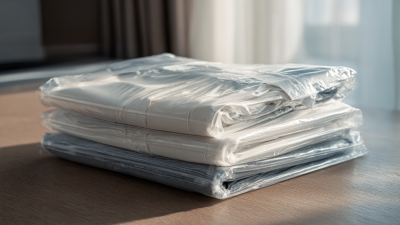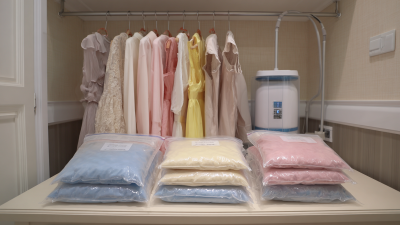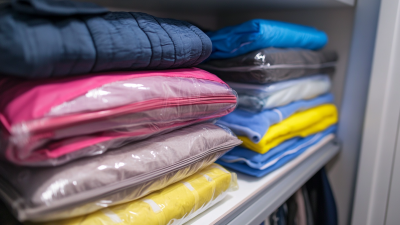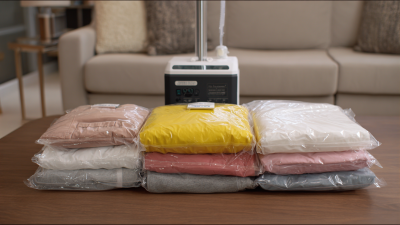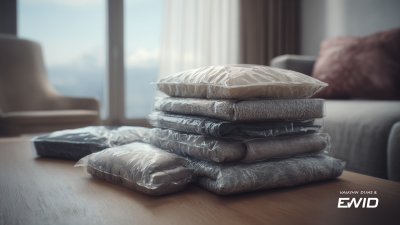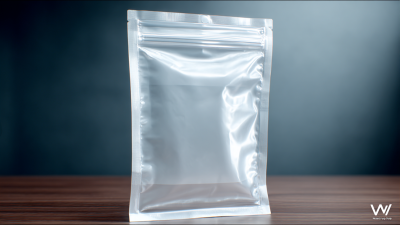In the ever-evolving world of e-commerce, sourcing high-quality products is paramount to ensuring customer satisfaction and business success. Among the trending items that have captured the attention of eco-conscious consumers are Cloth Compression Bags. These versatile storage solutions not only optimize space but also promote sustainable practices by reducing the need for plastic. However, navigating the global market to find the best quality Cloth Compression Bags can be challenging, given the plethora of options available.

This ultimate checklist will provide you with essential guidelines and best practices for sourcing these bags effectively, ensuring that you make informed decisions that enhance your product offerings and resonate with your target audience. Whether you are a retailer, wholesaler, or an entrepreneur venturing into the world of e-commerce, this guide will equip you with the knowledge necessary to secure top-notch Cloth Compression Bags from suppliers across the globe.
When sourcing high-quality cloth compression bags globally, several essential factors must be considered to ensure the best possible products. According to a report by Grand View Research, the global compression bags market is expected to reach USD 1.2 billion by 2025, reflecting a growing demand for eco-friendly and durable packaging solutions. One critical aspect to focus on is the material quality. High-quality cloth compression bags are often made from durable fabrics such as nylon or polyester, which not only offer durability but also enhance the aesthetics of the product.
Moreover, the manufacturing standards and certifications of suppliers play a vital role in the sourcing process. Reports from the International Organization for Standardization indicate that products manufactured in compliance with international standards tend to have lower defect rates—typically around 2-5%, compared to 15% for non-compliant products. Importers should also investigate the environmental impact and production processes of potential suppliers, as sustainability is becoming an increasingly important factor for consumers. Selecting suppliers that adhere to eco-friendly practices can appeal to the conscious customer and improve brand reputation globally.
| Factor | Description | Importance Level | Notes |
|---|---|---|---|
| Material Quality | Assess the quality of the fabric used in the bags. | High | Prefer eco-friendly materials. |
| Supplier Reputation | Check reviews and feedback from previous customers. | High | Look for long-standing businesses. |
| Price Comparisons | Analyze pricing among different suppliers. | Medium | Beware of very low prices indicating poor quality. |
| Customization Options | Check if suppliers offer branding or design customization. | Medium | Customization can enhance product appeal. |
| Production Capacity | Evaluate whether the supplier can meet your order size. | High | Ensure they can handle fluctuations in demand. |
| Shipping and Logistics | Understand the shipping options and costs. | Medium | Consider lead times for international shipping. |
| Compliance and Certifications | Ensure suppliers meet safety standards and regulations. | High | Request relevant documentation upfront. |
| Customer Service | Evaluate responsiveness and support offered by suppliers. | Medium | Good customer service can facilitate smoother transactions. |
When sourcing high-quality cloth compression bags, it's essential to identify the top manufacturing countries that meet industry standards. According to a recent market analysis by Research and Markets, the demand for compression bags is projected to exceed $2 billion globally by 2025, with substantial contributions from countries like China, India, and Vietnam. These nations are not only renowned for their competitive pricing but also their commitment to quality and innovation in textile production.
**Tip:** When evaluating manufacturers, consider their certifications—ISO 9001 and Oeko-Tex Standard 100 are indicative of high-quality textile standards. This can significantly influence the durability and safety of the products you source.
Moreover, countries such as Portugal and Turkey are gaining traction due to their advanced manufacturing capabilities and sustainable practices. A report from Mordor Intelligence highlights that the European market is transitioning towards eco-friendly materials, making these locations ideal for sourcing high-quality cloth compression bags designed with environmental sustainability in mind.
**Tip:** Always request samples before finalizing any orders. This will allow you to assess the fabric quality, stitching, and overall functionality of the compression bags to ensure they align with your brand’s standards.

When sourcing high-quality cloth compression bags globally, it's crucial to evaluate suppliers based on specific certifications and standards that ensure product safety and environmental sustainability. According to a recent industry report by Grand View Research, the global market for compression bags is projected to grow significantly, with rising consumer awareness about environmentally friendly packaging driving demand. Suppliers adhering to certifications like ISO 9001, which ensures quality management systems, can be prioritized as they demonstrate a commitment to maintaining high manufacturing standards.
Another important certification to look for is the OEKO-TEX Standard 100, which tests textiles for harmful substances. Reports indicate that around 73% of consumers are more likely to purchase products that are certified as being free from harmful chemicals. Additionally, certifications from organizations like the Global Recycling Standard (GRS) are becoming increasingly relevant as sustainability takes center stage in consumer preferences. Ensuring that your supplier has these certifications not only mitigates risks but also enhances your brand’s reputation in a competitive market.
When sourcing high-quality cloth compression bags globally, evaluating supplier quality and reliability is paramount to ensure successful partnerships. One effective strategy is to implement a comprehensive vetting process that includes assessing the supplier's certifications and adherence to industry standards. This can include certifications such as ISO or compliance with eco-friendly materials. Requesting samples of their products allows for a hands-on evaluation, ensuring that the compression bags meet both quality and durability expectations before placing larger orders.

Another key approach is to investigate the supplier’s track record by seeking testimonials and reviews from previous clients. Engaging with existing customers can provide insights into the supplier's responsiveness, communication, and overall reliability. In addition, consider utilizing third-party quality inspection services before shipment to further mitigate risks. These precautions not only enhance the chances of sourcing high-quality products but also foster long-term relationships based on trust and transparency, vital for navigating the complexities of global sourcing.
When sourcing high-quality cloth compression bags globally, negotiating the right prices and terms with manufacturers can significantly impact your bottom line. Understanding the market landscape is crucial; research different suppliers and their offerings to establish a benchmark for what constitutes a competitive price. It’s important to communicate clearly about your needs and expectations, as this transparency fosters trust and helps in securing better deals.
In negotiations, consider leveraging bulk purchasing power or long-term partnership potential to influence pricing. Don't shy away from asking for discounts on larger orders or extending terms for payment that can ease your cash flow. Be prepared to discuss quality guarantees or samples, which can serve as a bargaining chip to ensure that you receive the best product without compromising your budget. Ultimately, a well-informed and strategic negotiation approach will lead to a fruitful relationship with your compression bag manufacturer, benefiting both parties involved.
